Rossport: Another Season of Resistance
Katie | 22.11.2007 09:09 | Rossport Solidarity | Ecology | World
Since 2000 the small rural community of Rossport, County Mayo, Ireland have been engaged in an epic battle trying to prevent Shell from building a potentially devastating onshore gas refinery and high pressure pipeline in their remote and environmentally sensitive region. Despite Shell’s status as one of the world’s largest multinationals and it’s enjoyment of the full support of the Irish state, the spirited and effective resistance of the local community means that four years after the refinery was intended to be fully operational, the project is still in its infancy.
For many different reasons the struggle is truly inspiring. The Shell to Sea campaign is fought on a multitude of levels, from the international political arena, to on the ground at the daily picket at the proposed refinery site. It has been an eventful seven years and this autumn has been no exception. Over the past few months direct action against the development has included national days of action attended by hundreds of people from around Ireland, community led direct action preventing preparatory pipeline work and regular blockading of trucks entering the refinery site by those attending the daily picket. Also during this period, campaigners were ordered to leave the two year old Rossport Solidarity Camp. Meanwhile the project has met renewed opposition from NGO’s, including the Irish National Trust, who recently spoke out publicly against the project and outlined their intention to challenge its legitimacy in the European courts.
And of course, where there is resistance, repression follows shortly after. The local court sessions have become increasingly dominated by Shell to Sea cases and protesters have been subject to dubious convictions and excessively harsh sentences, including one woman being sentenced to three months in prison for her part in a peaceful lock-on blockade. As winter sets in resistance continues. The rest of the article outlines the significant events of the last few months in more detail…
Recent Indymedia articles: 1 | 2 | 3 | 4 | 5 | 6 | 7 | 8 | 9 | 10 | 11 | 12 | IMC UK Rossport Solidarity Topic
Other links: Shell To Sea | Indymedia Irelend Mayo Features
Films: Policing The Pollution: "Don't Mention The Water." | Stopping Shell from drilling the SAC | Rossport Shell site storming | Shell gas refinery blockade at bellanaboy
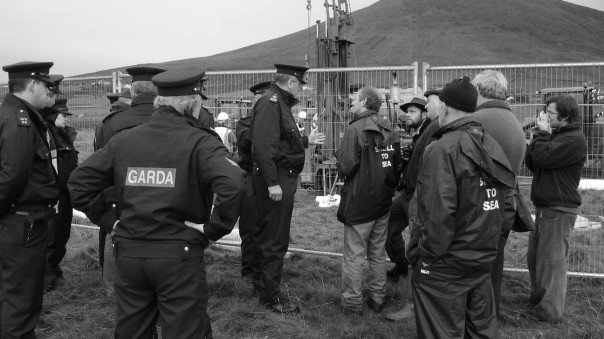
Stopping drilling
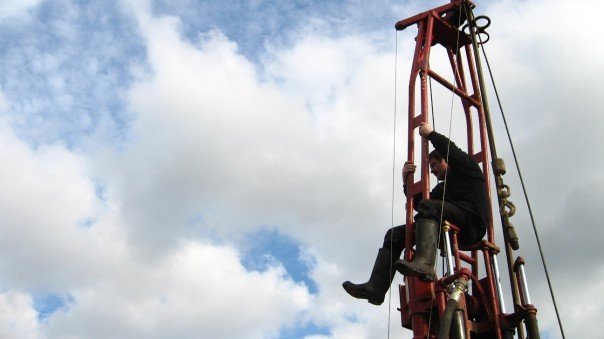
Stopping drilling 2
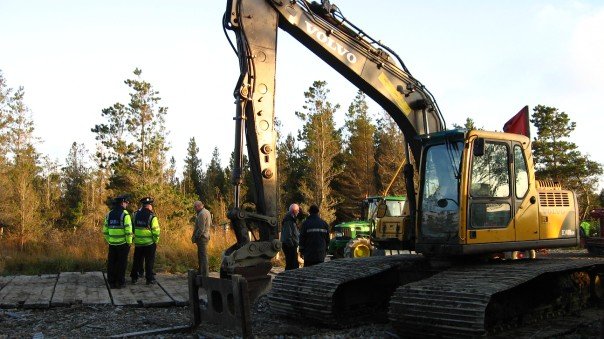
Stopping survey work
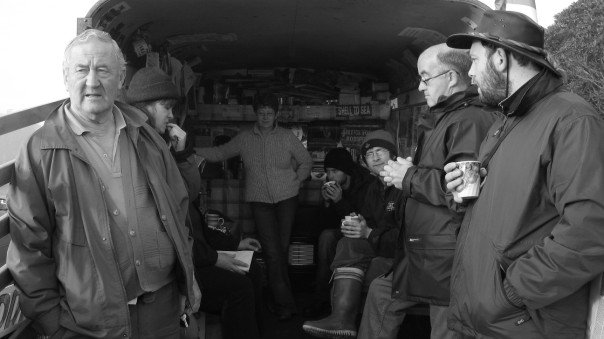
Taking a break at morning picket
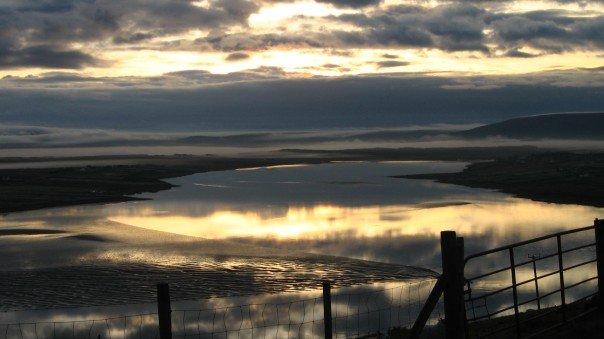
View of rossport over estuary
Shell’s project has consistently been facilitated by the Irish state. Over the past seven years planning and environmental laws have been changed to accommodate the development and massive numbers of police drawn in to quell resistance. This month Shell crossed one of it’s final bureaucratic hurdles when the refinery was given an operating license by the Environmental Protection Agency (EPA). The granting of the license did not come as a surprise. Shell are already part way through construction of the refinery and were well aware the decision by the agency was a fait accompli. Concerns about the potential dangers the refinery poses to the local community have come from many angles. Most recently, prior to the EPA’s verdict, An Taisce (the Irish National Trust) began a high profile campaign against the refinery,. They focused primarily on it’s location in the water catchment area of the local reservoir, Carrowmore Lake. The reservoir provides the drinking water for over 10,000 people and An Taisce stated that if the refinery went into operation, the reservoir would inevitably have to be closed as a source of drinking water. Locating a gas refinery in a water catchment area is unprecedented in Europe and on these grounds alone the license should not have been granted. The EPA’s decision will be challenged in both the Irish and European courts. At the same time as An Taisce came on board, Green Party support at the national level disappeared. Since gaining some power in national government, the Green‘s strong stance against the project has reversed. Previously party policy stated that, "the Green Party in government will not approve of a production pipeline consent being signed as part of the Corrib gas project until the completion of a full independent review of the best development concept for the project". Their current position, articulated by Green party politician and Minister for Energy Eamon Ryan, is that the government “cannot commit” to the proposed review and that legal advice suggests that the planning decision cannot be reversed. The betrayal by the Green Party is yet another nail in the coffin for the community’s faith in the democratic process. In terms of defeating the development through political channels, there remains little hope. Experience has repeatedly shown that it is grassroots support that the community can rely on and if the project is to be halted it will be through sustained grassroots resistance making the project unviable socially, economically and/or politically.
For over a year, the picket at the refinery site at Bellanaboy prevented Shell from beginning development of the refinery. In October last year, the government transferred hundreds of Gardai (police) to the area to violently break the picket and allow Shell to commence work. There was popular outrage as images of the Gardai beating the community off the roads hit the headlines. The support that had developed during the imprisonment of the Rossport five in 2005 was rejuvenated and hundreds of people traveled to the area to show their solidarity at national demonstrations. The Garda violence escalated and many people were injured, some seriously. In the face of this state repression, the community took the decision to call off a major demonstration last November. In hindsight it is generally accepted that this was a tactical error. Many believe that the police brutality at Bellanaboy was set to ignite a constitutional crisis as people across Ireland responded with anger to what was (and is) essentially the use of the Gardai as a private security firm for Shell. The cancellation of the demonstration meant the campaign lost momentum, particularly at the national level. The state gained the upper hand and work on the site commenced in earnest. A year later, significant lessons have been learned from this experience and ideas of what the community led campaign views as effective and acceptable political action have changed. Over the summer this strategic evolution saw lock-ons used as a blockading tactic and this autumn has seen small actions and national demonstrations at Bellanaboy with a clear focus on direct action.
There have been three national days of action held at Bellanaboy so far this autumn. On each occasion hundreds of people attended and the focus was on taking direct action to stop work. Protesters engaged in sit-down blockades to prevent vehicles accessing the site and also took part in occupations of the site. On the first day of action in September, the front gates to the refinery were kicked in and the site occupied by around 100 people. Last week, there were several smaller incursions into site with people climbing or cutting holes in the perimeter fences. Protester numbers were always matched by those of the Gardai who responded with violence to the protests. Many people received cuts and bruises, some people had thumbs dislocated as the Gardai attempted to remove them from sit-down protests and one man was run over by a lorry ordered through a sit down blockade by the Gardai. On the evening of the last day of action the two quarry companies involved in construction at the refinery site were targeted and property destroyed. It is unclear whether this was directly related to the campaign. In addition, solidarity actions took place nationally and internationally on each of the days of action, locations included, Belfast, Brighton, Madrid, Bristol, London, Nottingham, Reading, Leeds and Edinburgh.
Massive resistance in 2005 forced Shell to abandon their original pipeline route. In September this year, Shell announced a shortlist of three new potential pipeline routes for the project. As the raw gas pipeline is opposed in any form, no route is acceptable. Meetings to organize opposition were attended by up to a hundred people. On each proposed route there were people who pledged to go to prison rather than allow Shell onto their land. In late October, Rural Planning Services (RPS) began work drilling test bore holes as part of their survey of each routes viability for the pipeline. On several occasions people from the community and Rossport Solidarity Camp took action to stop work. The drilling machine was climbed (and crawled under) and large numbers of people refused to leave until work had stopped. As the surveys continue over the following month these scenes are likely to be repeated.
The action against drilling described above is one of many examples of how the community and Rossport Solidarity Camp work together. The camp is securely embedded in the community and a mutually supportive relationship exists between the two. Many local people firmly state that there is no separation and camp members are an integral part of their community. At the end of summer the camp was ordered to leave by the county council. Following several court cases the camp agreed to vacate by January 2008. Takeing down a two year old camp is no small task and work is ongoing. The community have supported the camp in this process in many ways, from providing a new home, to physically helping with the camp removal. The new camp location is now well established and visitors are always welcome.
Despite numerous incidences of the law being broken during Shell to Sea protests, the number of arrests of campaigners has been minimal. One of the senior officers policing the protests, Supt Gannon, has described the ‘no arrest‘ policy in Garda Review, “That was part of our strategy. We did not want to facilitate anyone down there with a route to martyrdom. That has been the policy ever since.” However, while in general the Gardai prefer the use of violence to detention, there are exceptions. These exceptions have usually involved either people who have taken part in lock-on actions, or high profile campaigners who have been maliciously prosecuted by the Gardai, typically charged with assault. The local court is only in session once a month and the last few sittings have been dominated by these Shell to Sea cases. All cases have been heard by Judge Mary Devins. The two separate trials for lock-on actions [ 1 | 2 ] saw all the participants found guilty of some of their charges and sentenced to 100 and 150 hours of community service, respectively. One of the women involved in the first lock-on was found unsuitable for community service by her probation officer on health grounds. Upon hearing this Judge Devins sentenced her to three months in prison. Two other major cases before the Judge involved several prominent campaigners being charged with assaulting Gardai. In both instances the defendants vigorously denied the charges and the only evidence provided by the prosecution were Garda testimonies. In July she convicted three fishermen of assault and sentenced them to three months in prison. Their appeal is coming up shortly. Last week, she found John Monaghan, the local Shell to Sea spokesperson, guilty of assault and sentenced him to a 6 month suspended sentence and a 750 Euro fine. He is planning to appeal. There is widespread disbelief at the verdicts and the partiality of Judge Devins is being questioned from many quarters. On several occasions she has been asked to disqualify herself from presiding over Shell to Sea cases by defense counsel. An open letter to the President of the District Court by barrister Shauna Gillian outlines some of the key concerns, “Justice must be done and justice must be seen to be done. …Judge Devins has crossed the Rubicon from “apparent” to “actual” bias [against Shell to Sea campaigners]….. Judge Devins is the wife of … Jimmy Devins of Fianna Fail, the party who made the original deal with Shell and who have a clear continuing interest in protecting the Shell Corporation.” Over the coming months more cases are set to come to trial, at present it seems probable more dubious convictions are likely.
As the community and camp settle in for a harsh Mayo winter the momentum generated in the campaign over autumn looks set to continue. Pipeline resistance is ongoing, as of course is the daily picket, and further national days of action are likely. The battle is far from over, seven years on the campaign is still going strong and there is much to be learned from the determination of the people of Rossport.
What you can do
Visit the solidarity ‘camp‘. Visitors are always welcome. The house is set in a beautiful location and a visit provides an opportunity to learn more about the campaign and to support the community directly through joining the picket and taking part in action. Support roles are diverse and the functioning of the ‘camp’ depends on this diversity. Among other things people are needed for ‘camp-sitting’, DIY and to take part in action. If you are thinking of coming to take action try coming with ideas and, if possible, a crew! For more info and travel directions: rossportsolidaritycamp.com
Spread awareness of the campaign in your local area. E-mail the camp for propaganda (it should be downloadable online soon) rossportsolidaritycamp at gmail.com
Organise a solidarity action at your local Shell garage or distribution centre - see shell.com for addresses.
Organise an action or picket at the Irish embassy or Shell HQ (both in London)
Katie